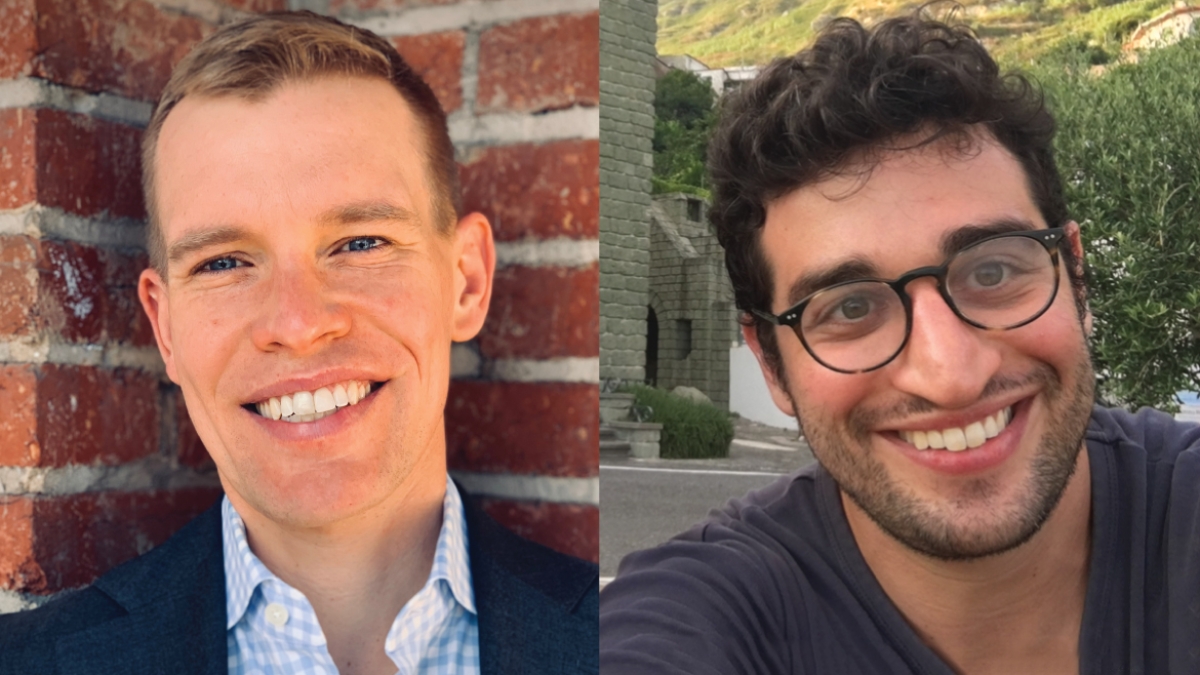ASU Law awards Morrison Prize to duo for article on energy policies

Matthew R. Christiansen, general counsel at the Federal Energy Regulatory Commission (left), and Joshua C. Macey, professor at the University of Chicago Law School (right).
Joshua C. Macey, professor at the University of Chicago Law School, and Matthew R. Christiansen, general counsel at the Federal Energy Regulatory Commission, are the recipients of the 2022 Morrison Prize for their scholarly article “Long Live the Federal Power Act’s Bright Line.” Bestowed with the award last year, Macey is the first professor to win the prize twice.
The winning article interprets a trio of recent U.S. Supreme Court cases to articulate a coherent framework for determining when state or federal energy policies violate the Federal Power Act’s allocation of jurisdiction, an increasingly important and complicated question today as renewable energy, energy storage technologies and emerging competitive forces are transforming electricity markets across the country.
“I’m extremely grateful to receive ASU’s Morrison Prize and to be able to see the environmental law community in Phoenix,” Macey said. “ASU Law’s program on law and sustainability brings together an extraordinary and diverse group of environmental and energy law scholars. I’ve learned so much at this conference in the past, and it will be an enormous honor to talk about energy jurisdiction in May.”
The $10,000 award, an honor established in 2015 and administered through the Law and Sustainability program at the Sandra Day O’Connor College of Law at Arizona State University, recognizes the most significant published paper that has a positive, long-term impact on the advancement of the environmental sustainability movement. Eligible papers entered for consideration undergo independent review and scoring by a diverse group of full-time, non-ASU Law professors who teach in environmental, sustainability-related areas at accredited law schools across the nation.
“Competition to win the Morrison Prize continues to get stronger year after year,” said Troy Rule, professor of law and faculty director of ASU Law’s Law and Sustainability program. “This year, the field of contest entries was stronger than ever, and the winning article was truly outstanding.”
The annual Morrison Prize will be presented May 13 to Macey and Christiansen in a plenary session during the seventh annual SRP Sustainability Conference of American Legal Educators at ASU Law’s Beus Center for Law and Society, where law professors who conduct legal research in sustainability-related areas will gather.
“I am so grateful and honored to receive ASU’s Morrison Prize,” Christiansen said. “My thanks to the Sandra Day O’Connor College of Law, its faculty and the program on law and sustainability. I look forward to presenting the article with my friend Josh Macey in May.”
Each year, Richard N. Morrison, a Phoenix attorney and major supporter of ASU Law, funds the Morrison Prize, which has become one of the most distinctive national prizes for environmental legal scholarship.
In 2016, the inaugural winners of the Morrison Prize were Dave Owen, a professor at the University of California Hastings College of Law, and Colin Aspe, a freshwater conservation adviser at the Nature Conservancy, for their article “Trading Dams,” which described creative policy approaches for better balancing hydroelectric energy generation and environmental protection of the nation’s river system.
Past winners also include:
2021: Joshua C. Macey, assistant professor of law at the University of Chicago Law School, for his academic article “Zombie Energy Laws."
2020: Jim Rossi and Christopher Serkin, professors at Vanderbilt Law School, for their paper “Energy Exactions.”
2019: A six-author team, for their article “Climate change challenges for land conservation: Rethinking conservation easements, strategies, and tools.”
• Federico Cheever, professor at the University of Denver Sturm College of Law.
• Jessica Owley, director of the environmental law program at University of Buffalo — State University of New York.
• Adena R. Rissman, an associate professor at the University of Wisconsin-Madison Department of Forestry and Wildlife Ecology.
• M. Rebecca Shaw, chief scientist at the World Wide Fund for Nature.
• Barton H. Thompson Jr., a professor of natural resources at Stanford Law School.
• W. William Weeks, director of the Conservation Law Clinic at Indiana University’s Maurer School of Law.
2018: Hari M. Osofsky, professor at Minnesota Law School, and Jacqueline Peel, associate dean of the University of Melbourne Law School in Australia, for their academic article “Energy Partisanship.”
2017: Michael P. Vandenbergh and Jonathan Gilligan, professors at Vanderbilt University, for their article "Beyond Gridlock."
Those interested in participating in this year’s event on May 13 can register here.
More Law, journalism and politics
Can elections results be counted quickly yet reliably?
Election results that are released as quickly as the public demands but are reliable enough to earn wide acceptance may not…
Spring break trip to Hawaiʻi provides insight into Indigenous law
A group of Arizona State University law students spent a week in Hawaiʻi for spring break. And while they did take in some of the…

LA journalists and officials gather to connect and salute fire coverage
Recognition of Los Angeles-area media coverage of the region’s January wildfires was the primary message as hundreds gathered at…

